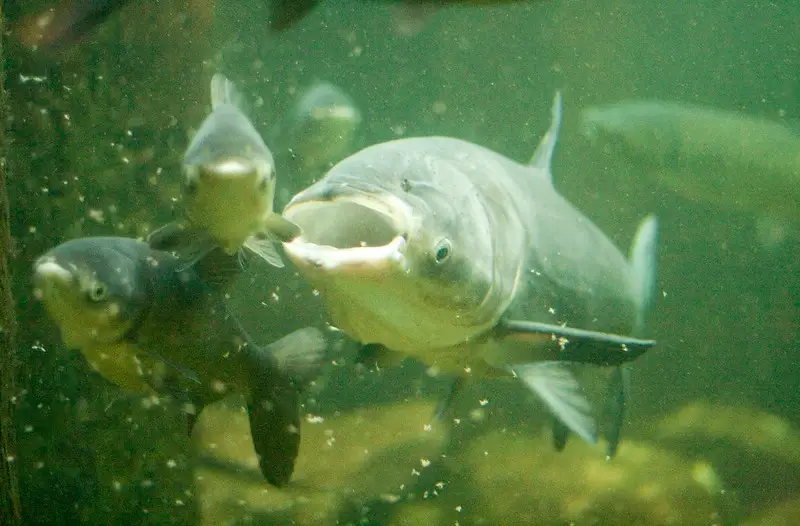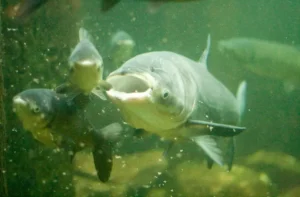
Asian Carp have been labeled a rather dangerous species for the local aquatic environments of North America.
While there have been many discussions on eliminating the growing number of these fish, it cannot be argued that the best possible method is to introduce predators in the wild that would consume them!
Today’s topic of conversation is ‘What Eats Asian Carp? – let us find out the quick answers!’
What Eats Asian Carp? 5 Common Predators
Recently, many studies have been conducted to evaluate the fish and other aquatic predators that consume Asian Carp. Let us understand the most important among them.
Alligator Gar, a native predator, is considered one of the best weapons against the invasion of Asian Carp in the Great Lakes.
Since the fish are large enough to be intimidating to most predators, species like the Blue Catfish are also coming to the rescue.
But the size has not limited or intimidated some predators – The White Bass is one fish that selectively consumes only the small-sized Asian Carp.
Others preying on Asian Carp fish include Largemouth Bass, Black Bass, White Crappie, Channel Catfish, and Flathead Catfish.
The Government has also started introducing the Great Lakes Muskellunge to the West Michigan rivers, hoping that this effective Predator will keep the numbers of breeding Asian Carp fish at bay.
In the sky, eagles and white pelicans have proved to be excellent solutions. Larger animals, like bears in captivity, have also instantly liked this fish.
Read more: How to Get Rid of Asian Carp?
Can Humans Eat Asian Carp – What Is A Copi Fish?
Scientists have also started encouraging humans to consume certain Asian Carp that can indeed be beneficial to our households while also keeping the numbers in check.
To get more people to try this fish out and remove the general stigma associated with Asian Carp, the Illinois Department Of Natural Resources has renamed this fish “Copi,” stemming from the word ‘copious.’
While the possession and sale of live Asian Carp are prohibited, selling frozen fish for consumption is relatively healthy as long as they are caught from the natural water bodies they have invaded.
Those looking for sustainable dietary supplements can try out Asian Carp – since these fish are harmful to the environment, eating them is an act of service!
Exporting Asian Carp fish back to China has also been considered. This is because local Chinese people do not have enough supply of this delicious fish while it is overflowing the rivers of North America!
If not for consumption, these also turn out to be excellent game fish, as catching these large bodies can be impressive and, at the same time, relatively easy.
Advantages Of Consuming Asian Carp – Keeping Invasive Fish Controlled
Humans and even pets are being encouraged to consume the inexpensive yet nutritional Asian Carp on a routine basis. This is why you should give it a try:
- Limit population through natural predation: The Asian Carp can be found in local water bodies, including the Mississippi River basin. They can be caught from the wild and consumed – by doing so, humans restore the ideal fish population.
- Introduce balance in local ecosystems: Instead of possessing and killing the Asian Carp for industrial purposes, consuming these fish can be a perfect way of introducing natural balance in the ecosystem.
- Protect aquatic resources in lakes and rivers: The native species of fish and other marine reptiles, such as the paddlefish and local bass, are highly threatened and even outnumbered by the Asian Carp. Consuming these fish will help plankton, lichen, and aquatic plants to grow.
- Great as pet food: Asian Carp are added to dog and cat food (duh) for that nutritional value. Dogs can easily chew the fishbone, even large Asian Carp fish. It is an excellent alternative for those pets that are allergic to traditional meat and gravy-based diets.
- Rich source of calcium and Omega 3: These fish are rich in protein and amino acids, including Omega 3 and Omega 6. The fish are also loaded with vitamin b12, calcium, and phosphorus. 19% of the Carp body contains Vitamin B6, 16% contains magnesium, 16% has Thiamin, and 18% contains Niacin.
- A gourmet addition to the luxury palate: These days, many five-star luxury restaurants have started using Asian Carp fish as a raw ingredient for different gourmet dishes.
While this has majorly been done to create awareness about the healthy consumption of Asian Carp, the giant fish has also proven to be a great visual and gastronomical delight.
Asian Carp is now being used to recreate traditional European and Asian fish dishes. The clean taste, healthy fat, and gigantic fish head make for a delicious dinner spread.
Must Read: 10 Fun Facts About Asian Carp That You Should Know
Final Thoughts
As we saw above, there are indeed some natural predators, including human beings, that consume Asian Carp and benefit from their nutritional intake.
What eats Asian Carp can, however, be another invasive name that we shouldn’t hurry to introduce – it is essential to know which creditors are native and harmless and which aren’t. Are there any essential names that we forgot in the list above? Let us know in the comment box below.
Frequently Asked Questions
Q1. Which natural predators consume the Asian Carp in East China?
Ans: Common native predators that feed on Asian Carp include White Bass, Largemouth Bass, Flathead Catfish, Blue Catfish, Muskellunge, etc.
Q2. Can humans eat the Asian Carp?
Ans: Asian Carp can be an excellent nutritional source of Omega-3 acids, protein, and healthy fat. It is also a great dietary supplement of vitamin E and vitamin K.
Q3. What does the Asian Carp eat in the US?
Ans: A young adult Asian Carp can be seen feeding on plankton, a general food source that many native fish species also depend upon. Adult Asian Carp feed on fish and insect larvae, aquatic plants, dead microorganisms, etc.



